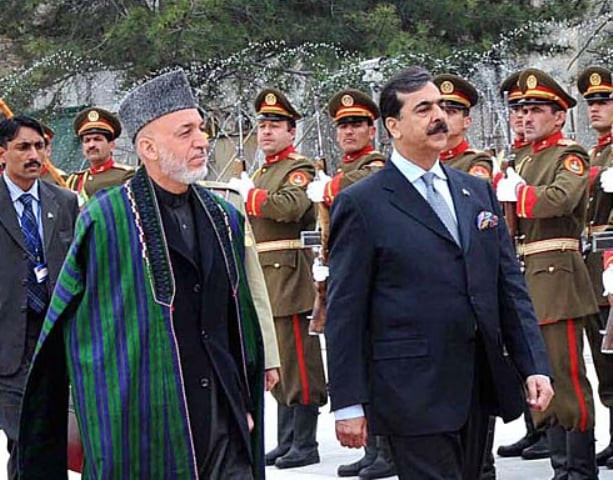Bridging trust deficit: Afghanistan, Pakistan upgrade peace commission
Military, intelligence officials to join the two-tier commission; the move has US backing.

In a significant move amid talks of reconciliation, Afghanistan and Pakistan agreed on Saturday to add top military and intelligence officials to a joint commission seeking peace with the Taliban. This measure, they said, would improve cooperation and bring peace closer.
Prime Minister Yousaf Raza Gilani said he and former Afghan president Burhanuddin Rabbani, who now heads the High Peace Council, would bring security chiefs into the joint commission.
The commission was originally set up in January to include foreign ministers from the two countries.
The first tier of the upgraded commission will include the chief executives, foreign ministers along with chiefs of the military and intelligence services of the two countries. And the second tier will comprise senior officials of foreign ministries, military and intelligence services.
“Today’s visit, I believe has been one of the most historical and unprecedented meetings, because all the stakeholders were with us,” Gilani said at a news conference with Afghan President Hamid Karzai at the presidential palace in Kabul after a fleeting day-long visit.
Pakistan will be crucial to any attempts to stabilise its western neighbour, although the two countries have had an uneasy relationship.
“I have assured President Karzai that Pakistan strongly supports an Afghan-led and Afghan-owned process for reconciliation and peace,” Gilani said.
He opposed the idea of setting preconditions for talks with the Taliban. “Conditions, qualifications or demands at this stage, in our view, may not be helpful,” he added.
President Karzai said the meeting with Gilani, which also involved Pakistan Army chief General Ashfaq Parvez Kayani and ISI chief Lt-Gen Ahmed Shuja Pasha, marked an important step forward for both neighbours. “Today we have clarity, which never existed before,” he said.
He said he had also discussed the move to upgrade the commission with US counterpart Barack Obama during a phone call last week, and it had the full backing of Washington.
“We welcome the participation of the US in this tripartite arrangement … We have recently seen more interest by the US in the peace process,” Karzai told journalists.
He said Pakistan’s role as a facilitator was also important and added that whatever Prime Minister Gilani said was a ‘fundamental shift’ of Pakistan from its past views. “We today have clarity, which never existed earlier,” Karzai said.
Both Karzai and Gilani said Saudi Arabia and Turkey could be involved in aiding future talks. Turkey is working to open a political office for the Taliban in Istanbul, which could help facilitate negotiations to end the war, a close aide to the Turkish Prime Minister was quoted saying on Friday.
Karzai said talks with the Taliban would be addressed within the framework of the joint commission.
“We both are suffering, we are brothers, we are neighbours, we should fight a common enemy. Therefore we should have a greater cooperation between both countries,” said Gilani. “There should be no blame game, because we want to stop terrorism.”
Pakistan’s ambassador in Kabul described the Kabul conclave as ‘very significant’. “It was the first time in the last 10 years that leaders from Pakistan and Afghanistan took crucial decisions to establish their bilateral relations on strong foundations without the help of a third party,” said Muhammad Sadiq.
“They also expressed their determination to resolve the decade-old Afghan imbroglio through negotiations,” he said.
The two leaders resolved that they would not allow a third country to exploit the situation arising from the Afghan war.
Sadiq called Saturday’s meeting unprecedented. “Such a meeting has never taken place in the world, thus far.”
“The two sides had discussions on a host of issues, including bilateral relations, regional security, terrorism and cross-border infiltration,” the ambassador said.
Asked whether India’s possible role in the Afghan reconciliation plan also figured in the meeting, Ambassador Sadiq said, “Our relations with Afghanistan have entered the next stage. And our relations are not directed against any other country.
“The Afghan president assured Pakistan that he would not allow any country or party to use the Afghan soil against Pakistan,” he said.
REUTERS, With additional reporting by Qaiser Butt in Islamabad
Published in The Express Tribune, April 17th, 2011.



















COMMENTS
Comments are moderated and generally will be posted if they are on-topic and not abusive.
For more information, please see our Comments FAQ